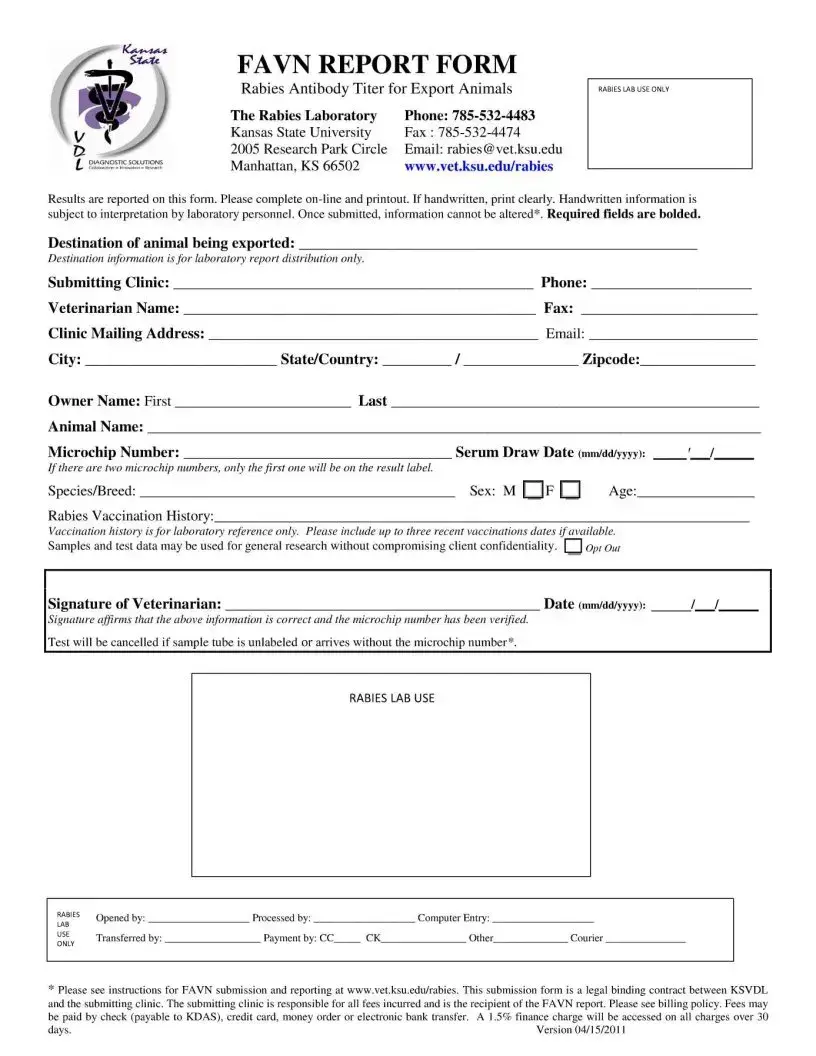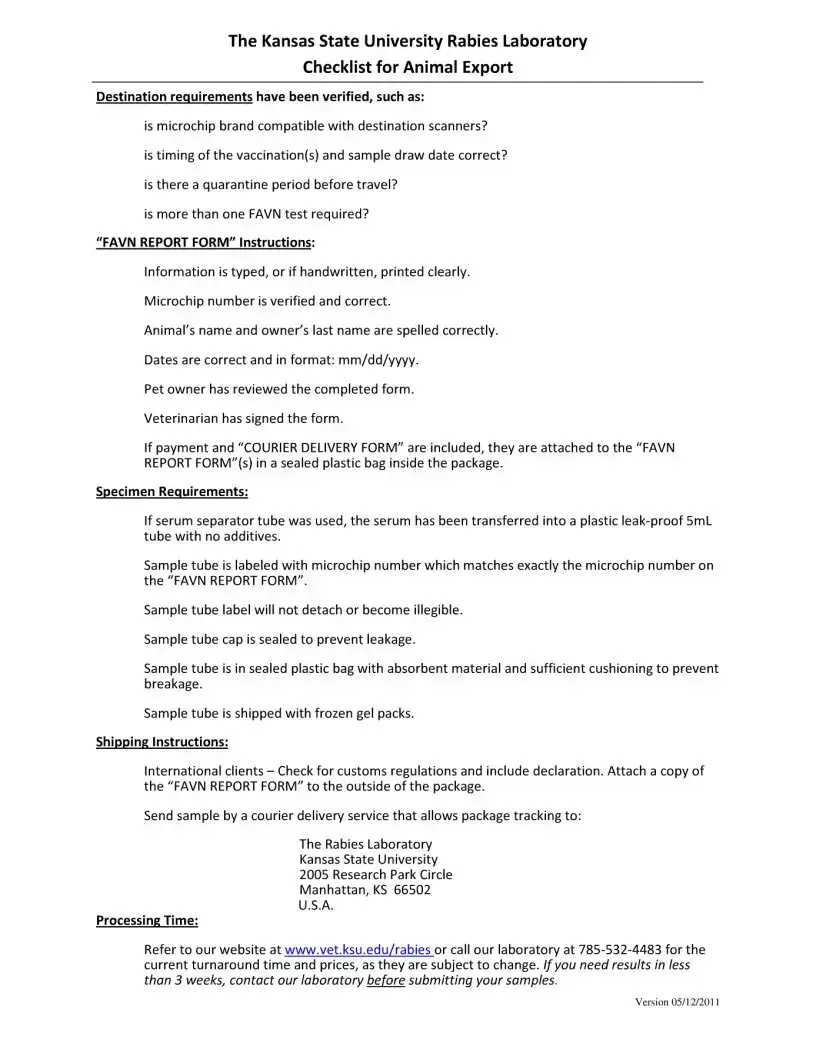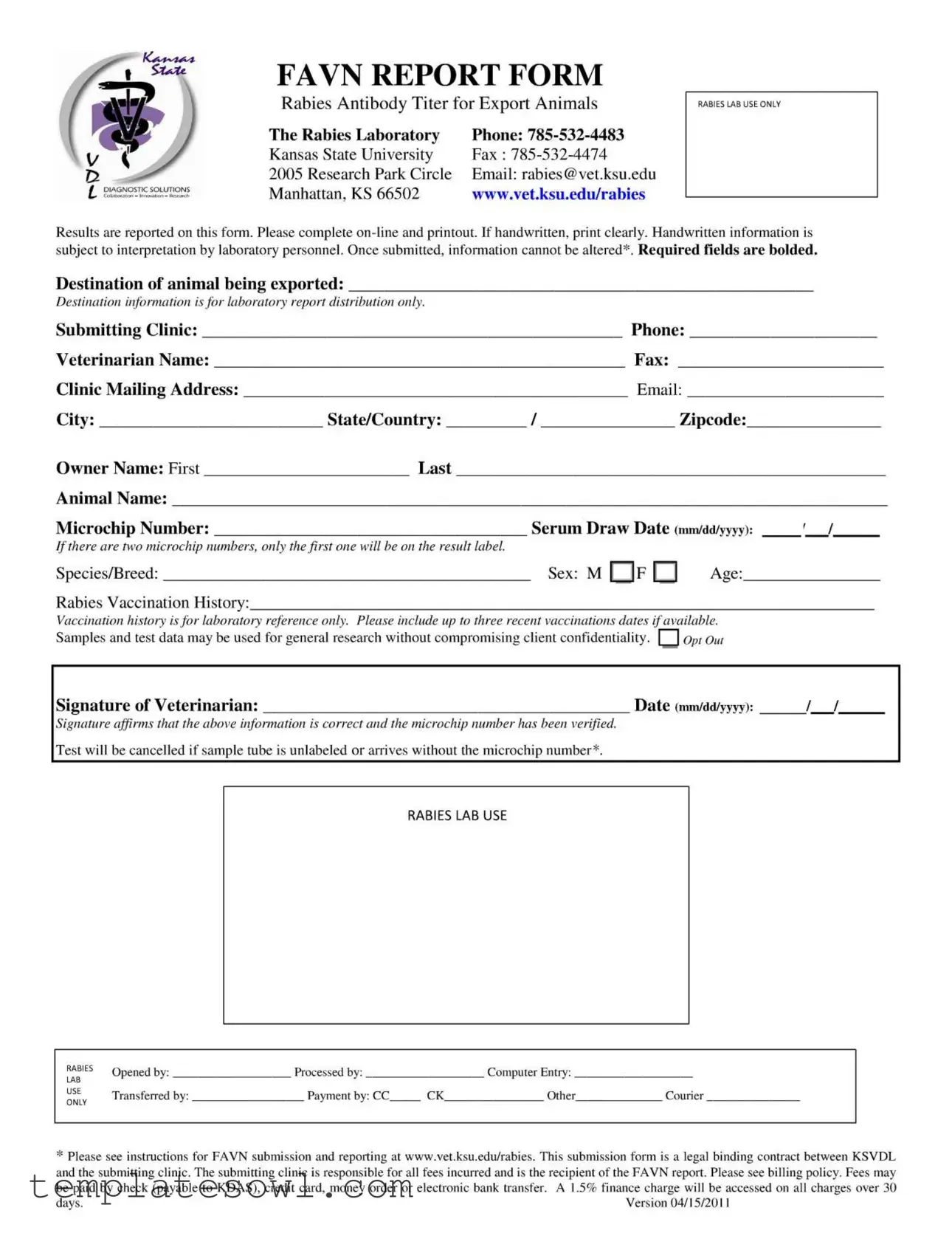Fill Out Your Kansas Favn Report Form
The Kansas FAVN Report Form plays a vital role in the international export of animals, ensuring that all necessary rabies antibody titer tests are completed accurately and promptly. This form facilitates the submission of test samples to the Rabies Laboratory at Kansas State University, streamlining the process for veterinarians and owners alike. Users are required to fill out the form meticulously, either online or by handwriting in clear print, as any ambiguity may lead to misinterpretation by laboratory personnel. Importantly, required fields are highlighted and must be completed to ensure submission success, as once the form is submitted, alterations cannot be made. Key information includes the destination of the animal—which is crucial for laboratory report distribution—and the detailed identification of the submitting clinic and pet owner, alongside the animal's microchip number. The form also records vaccination history and includes a section for the veterinarian to affirm the accuracy of the provided details by signing the form. Additional instructions detail specimen labeling, shipping protocols, and the importance of verifying microchip compatibility with destination scanners. This report is not just a collection of data; it is a binding agreement, underscoring the clinic’s responsibility for any incurred fees, thereby promoting accountability in the export process. As the world continues to interconnect, understanding the nuances of the Kansas FAVN Report Form becomes imperative for those involved in the movement of animals across borders.
Kansas Favn Report Example


Form Characteristics
| Fact Name | Fact Detail |
|---|---|
| Purpose of the Form | The FAVN Report Form is designed to report rabies antibody titer levels for animals being exported from the U.S. It is an essential requirement for meeting international travel regulations. |
| Governing Law | This form is governed by the Animal Health Protection Act as it pertains to rabies vaccination requirements for exporting animals. |
| Submission Guidelines | The completed form must be submitted online, printed out clearly for legibility, or handwritten in a readable manner. Once submitted, changes to the information cannot be made. |
| Payment Responsibilities | The submitting clinic is responsible for all fees related to the FAVN testing. Various payment methods are accepted, including credit card, check, and electronic transfers. |
| Confidentiality and Research Use | Sample data may be utilized for general research purposes, but the laboratory ensures that client confidentiality is maintained at all costs. |
Guidelines on Utilizing Kansas Favn Report
Once the Kansas FAVN Report form is completed, it must be submitted for evaluation. Properly filling out the form is necessary to ensure compliance with export requirements. Each section requires clear and precise information to avoid delays or complications. Below are the detailed steps to fill out the form correctly.
- Access the Kansas FAVN Report form online at the Kansas State University Rabies Laboratory website.
- Fill in the Destination of animal being exported section. This information guides laboratory report distribution.
- In the Submitting Clinic section, enter the Veterinarian Name, Phone, Fax, and Clinic Mailing Address.
- Provide the Email, City, State/Country, and Zipcode of the clinic.
- Enter the Owner Name, including both First and Last names.
- Complete the section for Animal Name and provide the Microchip Number.
- Specify the Serum Draw Date in the format mm/dd/yyyy.
- Indicate the Species/Breed, Sex (M or F), and Age of the animal.
- Complete the Rabies Vaccination History section, listing up to three recent vaccination dates if available.
- Include the Opt Out Signature of Veterinarian and the date of signature in mm/dd/yyyy format.
- Verify that all required fields are filled out correctly, ensuring legibility if handwritten.
- Confirm that the microchip number matches the one on the sample tube label.
- Prepare the samples as required, ensuring the microchip number is labeled and matches the form.
- Include payment and the "COURIER DELIVERY FORM," if necessary, sealing them in a plastic bag with the FAVN report form.
- Ensure the sample tube is packed securely with absorbent material and sufficient cushioning to prevent breakage, and ship it with frozen gel packs.
- Check customs regulations for international shipping, attaching a copy of the FAVN report on the package exterior.
- Send the completed package through a courier that allows for package tracking to the specified address of the Rabies Laboratory.
Taking the time to complete each of these steps thoroughly will help prevent any issues with the submission and ensure timely processing. Make sure to double-check all details and be mindful of timelines associated with the exportation process.
What You Should Know About This Form
What is the Kansas FAVN Report form?
The Kansas FAVN Report form is a document used to report the results of rabies antibody titers for animals being exported. It must be completed accurately and submitted to facilitate the testing process at the Kansas State University Rabies Laboratory.
Who can submit the Kansas FAVN Report form?
The form can be submitted by licensed veterinarians on behalf of pet owners. Veterinarians are responsible for ensuring that all required information is accurate and complete before submission.
What information is required on the form?
Key information includes the submitting clinic's details, veterinarian's contact information, owner's name, animal's name, microchip number, serum draw date, species, breed, sex, age, and rabies vaccination history. Required fields are clearly marked on the form.
Why is the microchip number important?
The microchip number helps to accurately correlate the animal's identity with its rabies antibody titer results. If the microchip number is missing or incorrect, the test may be canceled.
How should the sample be prepared for shipping?
The serum must be transferred into a leak-proof tube with no additives. The sample tube should be labeled with the microchip number and placed in a sealed plastic bag with absorbent material. Frozen gel packs must be included to ensure the sample remains cold during transit.
What happens if the form is completed incorrectly?
If the form is not filled out correctly, or if required information is missing, the laboratory may not process the test. It's crucial to double-check all details before submission to avoid delays.
How long does it take to receive test results?
Processing time can vary. Typically, results are reported back to the submitting clinic once the testing is completed. For specific timelines, it’s best to consult the laboratory directly.
What are the payment options for the FAVN test?
Payments can be made by check, credit card, money order, or electronic bank transfer. A 1.5% finance charge will apply to all charges that remain unpaid for over 30 days.
What should be done if the animal is not eligible for export based on titer results?
If the antibody titer does not meet the export requirements, follow up with your veterinarian for further guidance. They can advise on the necessary steps, including possible re-vaccination or retesting.
Common mistakes
Completing the Kansas FAVN Report form can be straightforward, but several common mistakes can hinder the process. One of the most frequent errors occurs with the microchip number. If this number is not verified or is incorrectly listed, it can result in cancellations of the test. Ensuring that this critical information matches the actual microchip implanted in the animal is vital.
Another common mistake involves the format of dates. The form specifies a required format of mm/dd/yyyy. If dates are not entered correctly, it could lead to confusion and delays in processing. Moreover, every date must be double-checked, as simple typos can have significant implications.
People often neglect to provide complete vaccination history. The report calls for up to three recent vaccinations, but omitting this information can prevent proper evaluation by laboratory personnel. This is especially important for ensuring compliance with international travel needs.
The spelling of names can also pose problems. Ensuring that both the animal's name and the owner's last name are spelled correctly is essential. Errors in names can lead to complications in identification during the testing process.
Some submitters do not thoroughly review the completed form with the pet owner. It is essential for owners to confirm that all provided information is accurate. Failing to do so could mean missing vital corrections before final submission.
In addition, the seller of services may overlook required attachments. When submitting the report, all necessary payment methods and the "COURIER DELIVERY FORM" must be securely included in a sealed plastic bag. Omitting these can result in the form being rejected and delayed.
People often disregard the importance of accurate labeling of the sample tube. If the sample tube is unlabeled or if the label becomes illegible, the testing will be canceled. The sample must clearly display the microchip number and be properly secured to prevent leakage.
Lastly, individuals may forget to check international shipping requirements. Different countries have varying customs regulations that must be adhered to for the importation of animals. Understanding these regulations and solving any potential issues prior to shipping can save a lot of time and complications later.
Documents used along the form
When exporting animals, especially concerning rabies vaccination requirements, several forms and documents may accompany the Kansas FAVN Report form. Each document serves an important role in ensuring compliance with health and safety regulations. Below is a list of commonly used documents along with brief descriptions of their significance.
- Rabies Vaccination Certificate: This certificate provides proof that the animal has been vaccinated against rabies. It includes details such as the date of vaccination, the vaccine used, and the veterinarian's signature.
- Health Certificate: This document certifies that the animal is healthy and free from diseases. It is usually issued by a licensed veterinarian and is often required for interstate or international travel.
- Microchip Registration Document: This document contains information about the animal's microchip, including the registration number, owner's details, and contact information. It helps verify the animal's identity.
- Cruelty-Free Declaration: Some destinations require a declaration that the animal was not subjected to cruelty or inhumane treatment during its care. This statement must be signed by a veterinarian or authorized personnel.
- Destination Import Permit: An import permit may be needed depending on the destination country or state regulations. This document authorizes the entry of the animal and outlines any specific health requirements.
- Transportation Agreement: This agreement outlines the responsibilities and terms regarding the transportation of the animal from its current location to the destination. It may involve both the owner and the transport service provider.
- Quarantine Documentation: If the destination imposes a quarantine period, this document specifies the duration and conditions of the quarantine, confirming that the animal will be kept under observation.
- Payment Confirmation: A document showing proof of payment for the tests and services related to the FAVN report form. This may include details of the transaction and the amount paid.
- Courier Delivery Form: This form provides details necessary for the delivery of the animal's samples and documents to the rabies laboratory, ensuring that everything is processed correctly.
Each of these documents plays a crucial role in the safe and compliant export of animals. Properly completing and submitting all necessary forms can help facilitate a smoother process and prevent potential delays or issues at the border or destination.
Similar forms
Veterinary Health Certificate: Similar to the Kansas FAVN Report, this document certifies that an animal is healthy and free from disease before export. Both require accurate details about the animal and the veterinarian's verification.
Rabies Vaccination Certificate: This document provides proof of rabies vaccination. Like the FAVN Report, it includes vaccination history and is critical for animal travel across borders.
Import Permit: Necessary for animals being imported into a new country, this document outlines health requirements akin to those found in the Kansas FAVN Report regarding rabies testing.
Microchip Registration Form: This form provides proof of microchip implantation, similar to the Kansas FAVN Report's need for microchip verification before sample testing.
Certificate of Veterinary Inspection (CVI): Issued by veterinarians, this document ensures compliance with health requirements for the export of animals, paralleling the regulatory nature of the FAVN Report.
Travel Health Permit: Required in many jurisdictions, this permit assesses the health status of an animal for travel, directly relating to the health checks mandated by the FAVN Report.
Animal Export Declaration: This document includes details of the animal’s health and identification. It aligns with the FAVN Report's focus on compliance with export regulations.
Sample Submission Form: Used in laboratory settings, similar to the FAVN Report, it documents samples submitted for analysis, ensuring proper identification and tracking throughout the testing process.
Animal Transport Security Declaration: This provides assurance about the conditions of animal transport, similar to how the FAVN Report ensures laboratory adherence to safety protocols during testing.
Export Certification for Animals: This formal certification acts like the FAVN Report by confirming an animal meets all export health requirements, including rabies testing and vaccination history.
Dos and Don'ts
When filling out the Kansas FAVN Report form, it is essential to follow best practices to ensure that the form is completed accurately and efficiently. Consider these dos and don'ts:
- Do complete the form online for better clarity; if handwritten, print clearly.
- Do verify that the microchip number is accurate and matches what is provided on the sample tube.
- Do review all dates to ensure they are formatted correctly as mm/dd/yyyy.
- Do ensure that all required fields, marked in bold, are filled out.
- Don’t leave any required fields blank, as incomplete information may delay processing.
- Don’t attach payment or other documents loosely; place them in a sealed plastic bag with the form.
- Don’t send the sample tube if it is unlabeled or if the microchip number is missing.
- Don’t forget to have the pet owner review the completed form before submission.
Misconceptions
- Misconception 1: People think the FAVN Report Form can be submitted with errors. In reality, any incomplete or incorrectly filled form can lead to rejection of the sample.
- Misconception 2: Some believe that the information can be altered after submission. However, once the form is submitted, the information is set and cannot be changed.
- Misconception 3: There is a notion that handwritten forms are acceptable without caution. Misinterpretation can occur, so it is advisable to complete the form online and print it out.
- Misconception 4: Many assume that the microchip number is not critical. The form states that a missing or unlabeled sample tube will result in cancellation of the test.
- Misconception 5: It is often thought that all vaccination dates are critical to include. In reality, the rabies vaccination history is mainly for laboratory reference, typically requiring only recent dates.
- Misconception 6: Some people believe that the destination information is not important. On the contrary, this information is used for proper report distribution.
- Misconception 7: There is a common misunderstanding that any courier service can be used for sample shipping. The submission guidelines specify the use of a courier that allows package tracking.
- Misconception 8: Many think that payment can be made at any time after submission. It's important to note that a 1.5% finance charge applies to all charges over 30 days.
- Misconception 9: Some believe that any veterinarian can fill out the form. The veterinarian must sign the form, affirming the accuracy of the information provided.
- Misconception 10: There is a belief that the FAVN report is a simple formality. In fact, it serves as a legal binding contract between the submitting clinic and the laboratory, holding the clinic responsible for all associated fees.
Key takeaways
The Kansas FAVN Report form plays a crucial role in ensuring compliance for exporting animals. Understanding its requirements is essential for a smooth submission process. Here are key takeaways for effectively utilizing this form:
- Accurate Information is Essential: All required fields, especially the microchip number, must be filled in accurately. Errors might lead to delays or cancellations of the rabies test.
- Submission Format: Complete the form online when possible, and ensure information is printed clearly if handwritten. Legibility is critical, as unclear writing may create complications during processing.
- Review and Verification: The veterinarian must verify the correctness of the microchip number, animal name, and owner’s last name. Pet owners should also review the completed form before submission.
- Shipping Requirements: Adhere to the specified shipping instructions. Use leak-proof sample tubes, securely label them, and provide adequate cushioning during transport. Ensure the package is sent via a courier service that allows for tracking.
- Attachments and Payments: If applicable, include payment details and attach the "COURIER DELIVERY FORM" inside a sealed plastic bag with the FAVN Report form to facilitate faster processing.
Following these guidelines can help ensure a successful experience when submitting the Kansas FAVN Report form, ultimately aiding in the safe export of animals.
Browse Other Templates
California Coe Benefits - Veterans must follow all instructions to ensure a smooth process.
Metlife Shareholder Services - Check with local authorities regarding any additional state-specific documentation needed.
California State Tax Exemption Form - The form must include the date when it is signed in Part D.
